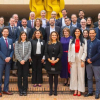Felipe Ramírez Buitrago, Bogotá's Secretary of Mobility, participated this Monday in the opening of the 23rd National Bike Summit 2022, convened by the North American League of Bicyclists, a non-profit organization that has been defending and promoting bike use in the United States since 1880.
Ramírez joined the event virtually and spoke about how the bicycle has become an engine of inclusion in Bogotá, as well as about the initiatives that position this means of transportation and bicycle users as key actors for an inclusive, equitable, and sustainable future.
In this tweet from Bogotá International Relations you can see part of the Mobility Secretary's participation in the Bike Summit 2022.
Contenidos relacionados
🚴🏽♂️The Secretary for the Mobility Sector, @felipe_ramir participated in the opening of #BikeSummit22, an event held by @BikeLeague, the League of American Bicyclists, a non-profit organisation that has promoted bike use in the United States 🇺🇸 since 1880. pic.twitter.com/Z8B68TEqz5
— Relaciones Internacionales Bogotá (@BogotaInter_nal) March 28, 2022
"The historical evolution of the bicycle in Bogota has been closely linked to citizen participation, giving rise to the promotion of several public spaces via social demands to make use of it and to consolidate collectives that promote bicycle use in Bogota", highlighted the Secretary of Mobility.
According to him, in Bogotá, the lower-income population has to spend up to two hours a day commuting, spending around 30 percent of their income on transportation. Hence the importance of the current Zoning Plan, which seeks to implement a 30-minute concentric city, through the development of mixed-use areas and the construction of cycling infrastructure, pedestrian corridors, and greater accessibility to services.
"1.2 million bike trips are made each day in Bogotá and its metropolitan region (880 in Bogotá and 290 in the region), along the 590 kilometers of permanent bike paths and 18 kilometers of temporary bike paths", said Secretary Ramírez.
For Bill Nesper, executive director of the North American League of Bicyclists, "the way Bogotá is facing the challenges related to bicycle mobility and the innovations it is implementing should inspire other cities to consolidate the bicycle as the most inclusive means of transportation for all".
Regarding the challenges for the future of cycling in Bogota, the secretary referred to the Barrios Vitales ('Vital Neighborhoods') strategy, which seeks to improve circulation and public space conditions within neighborhoods through tactical urban planning strategies. "The heart of this initiative is the interconnection between modes of transport and facilitating access to the city and its services for all citizens. We seek to benefit mainly pedestrians and bicycle users, redistributing public space that was previously dedicated only to vehicular traffic", he said.
At the end of his speech, Ramírez highlighted one of the most relevant advances that will benefit bicycle users and mobility in Bogotá, the Sistema de Bicicletas Compartidas (‘The Bicycle Sharing System’). "We are in the process of implementing the second largest system in Latin America which will include 1,500 electric bicycles 150 cargo bicycles and 150 bikes with child seats", he highlighted.




